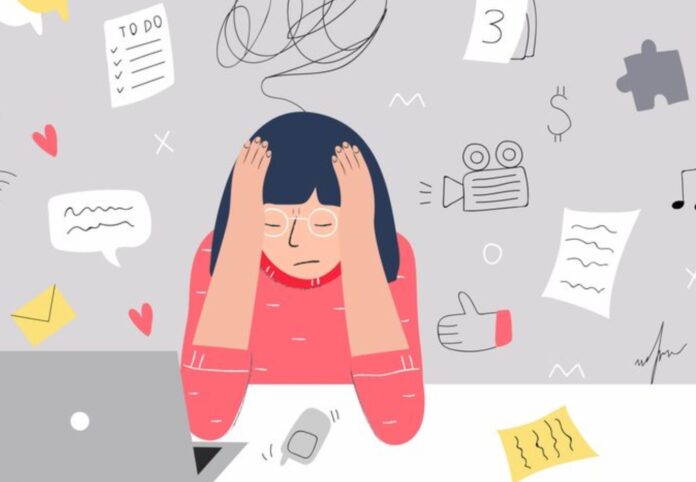Taking a career in healthcare administration to the next level often involves studying at the master’s level, but this is often juggled around several life commitments including work and family. The added demands of studying can turn your brain into a pressure cooker, which eventually explodes and presents itself as stress.
Spotting Stress Signs

People who are studying online mha programs to bolster their healthcare career are hardworking individuals, but the nature of studying remotely can lead to higher levels of stress and an unhealthy work/life balance. Therefore, to get the most out of your education, it’s important to understand the signs of stress, which include:
- Sleeping problems/fatigue
- Headaches
- Digestion issues
- Low sex drive
- Feelings of general anxiety/depression
If any of these symptoms sound familiar, then you’re most likely suffering from stress, which is why you’ll benefit from taking a little self-care.
Break it Up
The human brain has been proven to work better in small bursts, which is why you’ll find increased productivity if you tackle large assignments in short spells. For example, after 45 minutes of hard work, treat yourself to 15 minutes of downtime. This can be the perfect opportunity to walk to the shop for a healthy dose of fresh air and vitamin D.
Fitness and Health

A great way to jumpstart the brain and alleviate stress is through exercise, which has been proven to boost focus. You don’t need to spend hours working out; even as little as 20 minutes a day will be beneficial. Once you start moving and your heart rate increases, feel-good chemicals like dopamine will start flying around your body.
Alongside exercise, your body requires regular healthy meals because this will help it to get you through the day in one piece. Therefore, by introducing proteins, vegetables, and whole grains into your diet, you’ll find yourself feeling energized and fuller for longer.
Plenty of Sleep
The recommended amount of sleep for an adult is 7-8 hours per night, which allows your batteries to recharge and your body/mind to heal. To make sure you’re getting the right amount of sleep, follow a strict routine that involves turning off all screens for at least one hour before bedtime.
Catch a Movie or Play a Game

Even if you enjoy your career and studying, it’s not the type of enjoyment your subconscious yearns for. Make sure this need gets satisfied, which you can do by escaping into a good movie – there are plenty of options across various streaming platforms.
Alternatively, if you’re not happy with letting your brain completely switch off, then playing video games is a great way to improve cognitive thinking – just be careful you don’t allow a captivating game to burn into your study time.
Eliminating Distractions
Everyone can hold their hands up and say they’ve fallen into the pit of procrastination from time to time, but this isn’t conducive to studying. Therefore, you need to find ways to recognize procrastination and eliminate it.
To do this, you’ll need to understand your procrastination triggers. For example, if you often scroll aimlessly through social media instead of studying, then download self-control apps to limit your access.
Making Time for Loved Ones

Interacting with other people, especially those we care about, has been proven to support positive mental health. Therefore, you should make sure that you’re putting time aside to spend with your loved ones. These people will have your back and offer words of encouragement, which will immediately boost your self-esteem and confidence levels.
You don’t have to do anything too fancy to benefit from time spent with loved ones, it can be as simple as visiting a local coffee shop or having a virtual catchup.
Seeking Support
We’ve already established that your loved ones will play a huge part in increasing your mental health by offering words of encouragement, but they’re also a great resource for unloading problems. By sharing your issues you’ll feel the weight lifting, which can make way for increased productivity.
Outside of your friendship group, stress can take you into dark places that call for more professional support. Therefore, don’t feel ashamed or afraid of reaching out to a professional – the cost of your tuition should cover student support. With the help of certain therapies, you can break down the walls of stress and get back on track.
Making Schedules
If you fail to build a practical schedule to break up all your commitments, you’re opening the door to chaos and stress. Therefore, you should make an effort to plan your study time, which allows you the opportunity to break up overwhelming assignments into manageable tasks.
There are plenty of tools you can use to effectively plan your day. For example, Trello allows you to visually split your time up into lists, which are displayed on a digital Kanban board.
Reduce Alcohol Intake

Some people enjoy a glass of wine or two to top off a great week, which is perfectly fine when enjoyed responsibly. However, if having a drink becomes a means of dealing with high-stress levels, it’s going to become highly problematic because you’ll feel even more lethargic – this pattern will lead to a vicious cycle that may be hard to break. Therefore, before you have a drink, be sure to ask yourself why, and avoid alcohol before important deadlines.
Don’t Overdo the Caffeine
If you’re like the majority of the population, a cup of coffee is the perfect way to kickstart your brain into action in the morning. However, despite the obvious benefits of caffeine, it’s important to regulate intake to avoid loss of concentration and sleepiness, which means allowing yourself to have a short nap instead of guzzling the coffee to push through.
When life throws too many tasks and challenges at us, stress takes over to make matters worse. While you’re studying for your MHA, make sure you remain mindful of stress symptoms and take an active approach to release the pressure. You will be more productive if you stop forcing your brain to work when it’s crying out to stop.









